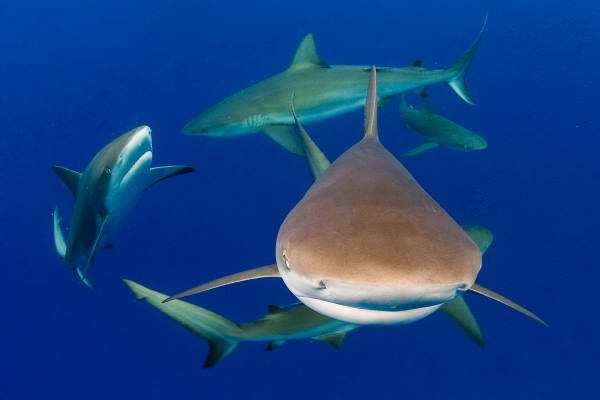 BONAIRE:--- The Kingdom of the Netherlands will ask for increased protection for the Caribbean reef shark during next month’s Conference of Parties for the Cartagena Convention (COPs) on Aruba. Caribbean reef sharks play a critical role in maintaining a healthy reef ecosystem and building resilience within the oceans. This increased protection is critical for ensuring a sustainable future for this iconic species.
BONAIRE:--- The Kingdom of the Netherlands will ask for increased protection for the Caribbean reef shark during next month’s Conference of Parties for the Cartagena Convention (COPs) on Aruba. Caribbean reef sharks play a critical role in maintaining a healthy reef ecosystem and building resilience within the oceans. This increased protection is critical for ensuring a sustainable future for this iconic species.
The Caribbean Sea is renowned for its crystal-clear waters, vibrant coral reefs, and a dazzling array of marine life. Among the charismatic inhabitants of this underwater paradise is the Caribbean Reef Shark (Carcharhinus perezii), a species that plays a crucial role in maintaining the health of coral reef ecosystems. In the Dutch Caribbean, these apex predators face mounting threats, but there is hope on the horizon. At the upcoming Conference of Parties for the Cartagena Convention (COPs), the Kingdom of the Netherlands will seek increased protection for these magnificent creatures by listing this species in Annex III of the SPAW Protocol. Annex III includes plant and animal species that require additional protection to ensure these species are able to adequately recover their populations in the Wider Caribbean Region.
Importance
Caribbean reef sharks thrive in warm, tropical waters of the Caribbean region, with a distribution range that stretches from Florida to Brazil. This species is one of the most encountered reef shark species throughout the whole Caribbean Sea. Growing up to 3 m (9.8ft) in length, this shark is one of the largest apex predators in the reef ecosystem and is at the top of the marine food web, having only a few natural predators.
In addition to being of great economic value, as shark diving is a major draw for divers from around the world, this species is also critical for maintaining balance within the reef ecosystem. Their presence helps regulate the population of smaller prey species, which in turn, prevents overgrazing on seagrass beds and coral reefs and eliminates sick or weak fish from the population. This balance is essential for maintaining the health and diversity of the entire coral reef.
Threats
Despite their ecological and economic significance, Caribbean reef sharks in the Caribbean face numerous threats that have led to a population reduction estimated to be between 50–79% over the past 29 years. In the (Dutch) Caribbean this is mainly caused by:
Habitat Degradation: The degradation of coral reefs and seagrass beds due to climate change, pollution, and coastal development has a direct impact on the availability of prey for these sharks. Loss of habitat reduces their ability to find food and shelter.
Overfishing: Overfishing poses one of the most immediate threats to Caribbean reef sharks. They are often caught incidentally in commercial fisheries, where fishermen are targeting other species, or intentionally, where they are sought after for their fins, used in shark fin soup.









